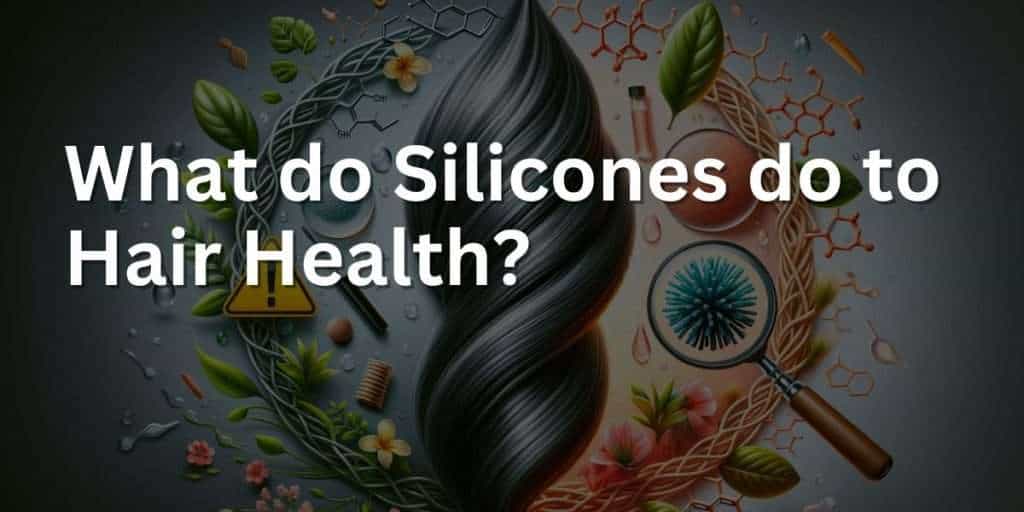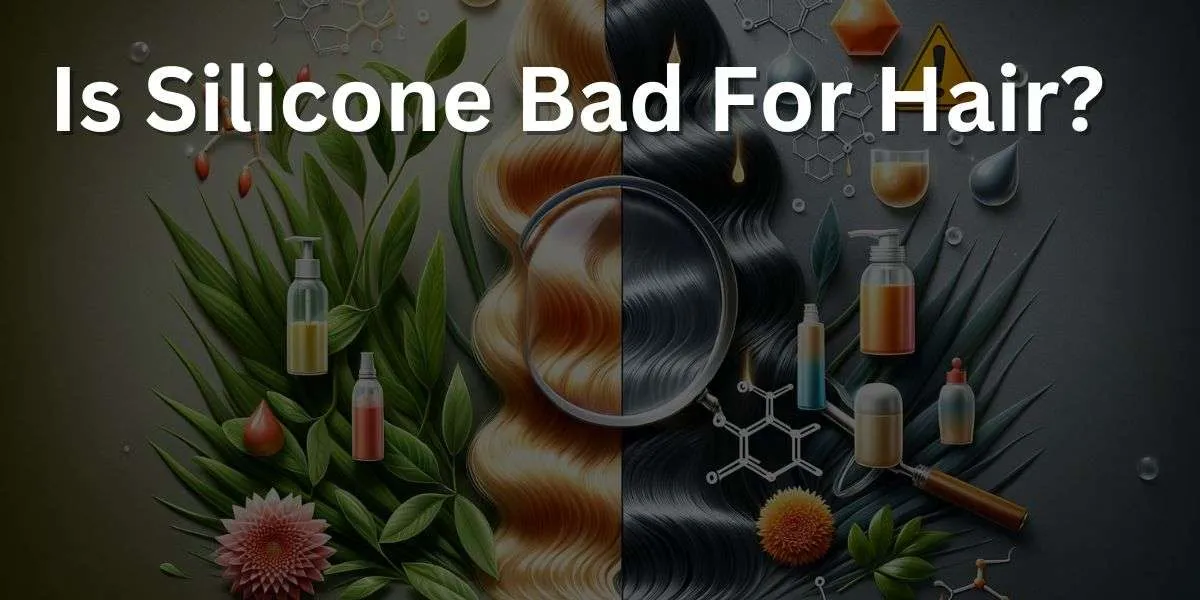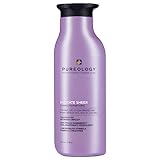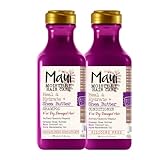Is silicone bad for hair? This question sparks debate among hair care enthusiasts and experts alike. As you ponder the bottles on your bathroom shelf, understanding silicone’s role in hair products is crucial.
In this article, we’re going to dissect the myths and truths about silicone, giving you a clearer view through the lens of science and hair care expertise. With a background in cosmetic chemistry and a knack for demystifying ingredient lists, I’m here to guide you through the silicone spectrum – from water-soluble to those that require a clarifying wash.
You’ll learn about the different types of silicones, how they affect different hair types, and the overall impact on hair health. We’ll also delve into alternatives for those seeking silicone-free options. By the end, you’ll be equipped to make an informed decision about whether silicone belongs in your hair care routine.
Ready to unravel the silky truth about silicones? Let’s dive in.
Key Takeaways: Is Silicone Bad for Hair?
Silicones provide benefits like smoothness and shine. They coat the hair shaft, which can create a smooth feel and a reflective surface, giving hair a shiny appearance.
They can lead to buildup over time. Silicones are not water-soluble, which means they can accumulate on the hair and scalp, potentially weighing hair down and making it look greasy.
Not all silicones are equal. There are different types of silicones used in hair care products, some of which are heavier and more prone to buildup, while others are lighter and can be washed out more easily.
Silicones may mask hair damage. By coating the hair, silicones can make it feel sleeker but may also hide damage rather than repairing it.
They can be problematic for curly hair. Silicones may prevent moisture from penetrating the hair shaft, which is especially detrimental for curly hair that requires more moisture to maintain its shape and health.
Silicone use requires proper cleansing. If you use silicone-based hair products, it’s important to use a clarifying shampoo regularly to prevent and remove buildup.
Not necessarily bad for hair, but use with care. Silicones are not inherently bad for hair, but they should be used with an understanding of how they affect your hair type and with proper cleansing routines.
What is silicone?
Silicones are a family of compounds that add a silky texture to hair and skincare products. They arise from the natural element silica and undergo several chemical processes to form silicones.
They create an attractive texture providing slack when applied and gives an appearance of shine on the skin and hair. There are several different varieties of silicone. Each has a different profile and characteristic.
Silicone is a type of polymer that can be found in many different products. Silicones are used for their waterproofing, lubricating and protective properties.
Whilst on the surface it would appear that these qualities make them the perfect ingredient for shampoos and conditioners. However, let’s dig deeper. Do they provide protection against breakage while conditioning hair to keep it healthy and shiny?
Water soluble silicones are well-known for their ability to prevent combing tangles and static. They do this by creating a protective barrier on the hair cuticle, which smooths down any jagged or rough edges that can snag strands of hair in other products (like hairspray).
Guide to Decoding Silicone Ingredients
A guide to decoding silicone ingredients in hair care products empowers you to make informed choices about what you apply to your hair. Understanding the various types of silicones and their properties can help you tailor your hair care routine to match your hair’s specific needs.
Water Soluble Silicones Dimethicone Copolyol Cyclomethicone Lauryl Methicone Copolyol Any silicone with PEG as a prefix
Non-Water Soluble Silicones Amodimethicone Dimethicone Pheryl Trimethicone Ceteraryl Methicone Dimethiconol Amodimethicon Stearyl DImethicone.
Silicones in hair products are often listed with names ending in -cone, -conol, -xane, or -siloxane. These ingredients play a role in enhancing hair’s texture and manageability by providing a smooth, conditioned feel. Dimethicone, for instance, is a common silicone that offers significant conditioning effects and heat protection.
Water-soluble silicones, such as those with PEG as a prefix, are designed to be easily washed out with water, making them a lighter choice that’s less prone to build-up. They provide the benefits of traditional silicones without weighing hair down, ideal for those who prefer not to use harsh cleansing agents to remove residue.
Silicones are like plastics in that they contain flexibility that can be moulded into anything. Silicones keep moisture away from the hair because it is hydrophobic meaning that water will not stick to it and penetrate through the surface. It can be found in shampoos, conditioners, styling creams for curly hair, gels etc
Most people are complaining about the weighing of the conditioner/ shampoo using silicone-based chemicals. This often happens for people who wash their hair frequently and can be avoided by limiting the number of times you shampoo and condition your hair per week.
Unlike some natural oils, silicones are extremely stable, meaning they do not degrade under heat or UV light to become something unknown or unwanted. This is especially important when it comes to hair products as they are often exposed to heat styling tools and direct sunlight on a regular basis.

What do Silicones do to Hair Health?
The effects of silicone on hair health can be quite nuanced. Silicones are synthetic polymers and are known for their ability to make hair feel silky and look shiny by forming a protective layer around the hair shaft. This can be particularly beneficial for detangling and smoothing frizzy hair, as the silicone works to coat the hair, reducing moisture loss and providing a sleek finish.
However, it’s important to understand the long-term interaction of silicones with hair. While they offer immediate aesthetic benefits, over time, silicones can build up on the hair, potentially weighing it down and leading to a lack of volume. This buildup can also create a barrier that prevents moisture and essential nutrients from penetrating the hair shaft, which might affect the hair’s natural balance and health.
For those concerned about the potential buildup, there are water-soluble silicones which are easier to wash out and less likely to accumulate. Additionally, using a clarifying shampoo periodically can help remove silicone buildup, restoring the hair’s natural buoyancy and shine.
Positive Aspects of Silicone Use in Haircare
The positive aspects of silicone use in haircare are numerous, offering a variety of benefits that enhance the hair’s appearance and manageability. Silicones, such as dimethicone, amodimethicone, and cyclomethicone, are praised for their ability to impart a silky, smooth texture to the hair. They coat the hair shaft, creating a sleek surface that reflects light, giving the hair a lustrous shine that many desire.
This smooth coating also serves a protective function, shielding the hair from environmental stressors such as pollutants and humidity, which can contribute to frizz and damage. Additionally, silicones can protect against thermal damage by forming a barrier that reduces the hair’s exposure to the high temperatures of styling tools.
Detangling becomes an effortless task with silicone-infused haircare products. They provide slip to the hair, allowing combs and brushes to glide through with ease, thus reducing breakage and making the styling process gentler on the hair.
Silicones can help to seal in moisture, preventing the hair from becoming dry and brittle. This is particularly beneficial for those with porous hair types that are prone to moisture loss.
Negative Aspects of Silicone Use in Haircare
The Negative Aspects of Silicone Use in Haircare, while often overshadowed by the immediate benefits, are important considerations for those mindful of long-term hair health. Silicones, particularly non-water-soluble types, can lead to buildup over time. This accumulation can weigh down the hair, leaving it feeling limp and lifeless, especially for those with fine or thin hair textures.
This buildup can also create a barrier on the scalp and hair, which might impede moisture and essential nutrients from penetrating the hair shaft. Consequently, hair may become more prone to breakage and less responsive to hydrating treatments or conditioners.
For individuals with curly or textured hair, silicones can sometimes mask the true condition of the hair. While they make the hair appear healthier, they may actually prevent the necessary hydration from reaching the hair strands, which is vital for maintaining natural curl patterns and preventing frizz.
Environmental impact is another concern. Silicones are synthetic and not biodegradable, contributing to the accumulation of pollutants in the environment. This aspect is increasingly significant for those who prioritize eco-friendly haircare solutions.
Understanding these facets of silicone use in haircare allows individuals to make more informed choices, balancing the immediate cosmetic effects with the potential for long-term hair health and environmental considerations.
Benefits of Silicone-Free Shampoo
Promotes natural hair texture and volume. Silicone-free shampoos allow your hair to retain its natural shape and fullness, without being weighed down by residue.
Improves moisture absorption. Without silicones coating the hair shaft, moisture can penetrate the hair more effectively, improving hydration.
Reduces the risk of buildup. Silicone-free formulas help prevent the accumulation of heavy residues on the scalp and hair, keeping them cleaner and lighter.
Encourages a healthier scalp. By avoiding silicone, you can maintain a healthier scalp environment, as there is less chance of clogged pores and reduced breathability.
Enhances the effectiveness of hair treatments. Treatments and conditioners can work more efficiently on hair that is free of silicone barriers.
Ideal for certain hair types. Those with fine, curly, or oily hair may particularly benefit from silicone-free shampoos, as they allow for better moisture and oil balance.
Environmentally friendly. Silicone-free shampoos are generally better for the environment, as they contain more biodegradable ingredients and fewer synthetics.
What shampoos don’t contain silicones?
Shampoos that don’t contain silicones are often labeled as ‘silicone-free’ and cater to those seeking a more natural approach to hair care. These shampoos utilize alternative ingredients such as natural oils, butters, and herbal extracts to provide the hair with moisture and shine without the use of synthetic silicones.
Any natural shampoo or solid shampoo bar or solid conditioner bars will not contain silicones. You can rest assured we have ensured that none of the natural shampoos we carry contains any form of silicone.
FAQs on Is Silicone Bad For Hair
Does silicone cause build up in hair?
One of the most common questions we get is whether silicone can cause buildup. The short answer is .. yes! Silicone, also known as polydimethylsiloxane (PDMS), is used in shampoos and conditioners for many reasons, but primarily because it helps hair stay smooth and manageable.
But just because something isn’t likely to cause problems doesn’t mean there aren’t any risks associated with using it! Here, we prefer natural haircare products!
Is silicone really bad for your hair?
Silicone may a good thing if the treatment leaves strands of hair softer, shinier and more manageable. However, not all treatments are created equally which means that using silicone-based shampoos on already damaged or chemically treated hairs could cause even further damage to your locks. This can lead to dryness and breakage.
There is some evidence to suggest silicone could lead to an imbalance of natural oils on the scalp and may even cause a buildup of product on the surface of strands which leads to dryness or breakage. To avoid this, use silicone-free shampoos on chemically treated or colour-treated hair.
Should I use a silicone free shampoo?
Overall yes, but it depends on you and your hair type. If you have dry, damaged hair then yes! Or if you prefer just to use natural organic ingredients in your personal care and rely on your own natural oils to give you shine, then no.
If you have very frizzy unmanageable hair, initially you may find silicone shampoo helps with shine and keeping the strands untangled. However, over time be aware this could lead to dry, damaged broken hair.
Is silicone bad for your scalp?
There are some downsides to the use of silicone in shampoo, however. Silicone molecules are larger than water molecules and can’t be rinsed out as easily with just water; they also build up on hair strands faster than other ingredients so may require more frequent washing for this reason.
This buildup is also more difficult to remove than other ingredients, such as sebum and sweat, so it can be a concern for those with sensitive skin or scalp.
Is silicone bad for natural hair?
There are some who believe that silicone in shampoo may also make hair less healthy over time because the conditioners coat strands of hair without actually nourishing them; this may cause split ends and breakage.
On the other hand, if you love the way silicones make your hair look and feel (over 50 per cent of hair-care products use some type of silicone), the best way to get the benefits without the buildup is to use a clarifying shampoo every other wash.
But if you find that shampoo strips your hair and scalp of essential oils and moisture, it may be best to join the no-cone movement. It may take time to detox your hair and switch to a natural shampoo when you stop using hair products which contain silicone.
Silicone products are quite pervasive within the beauty industry and it can be quite hard to find silicone free products.








